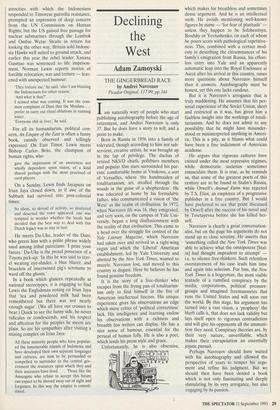Declining the West
Adam Zamoyski
THE GINGERBREAD RACE by Andrei Navrozov Picador Original, £17.99, pp.344 Iam naturally wary of people who start publishing autobiography before the age of retirement, and Andrei Navrozov is only 37. But he does have a story to tell; and a point to make.
Born in Russia in 1956 into a family of tolerated, though according to him not sub- servient, creative artists, he was brought up in the lap of privilege. The dachas of retired NKVD chiefs, politburo members and popular film stars surrounded his par- ents' comfortable home at Vnukovo, a sort of Versailles, where 'the handmaiden of totalitarianism, art, strolled through the woods in the guise of a shepherdess'. He was educated at home by his formidable father, who communicated a vision of 'the West' as the realm of civilisation. In 1972, when Navrozov fi/s was 16, they emigrated, and very soon, on the campus of Yale Uni- versity, began a long disillusionment with the reality of that civilisation. This came to a head over the struggle for control of the Yale Literary Magazine, which Navrozov had taken over and revived as a right-wing organ and which the 'Liberal' American establishment, led by Yale University and abetted by the New York Times, wanted to muzzle. Navrozov lost, and moved to this country in disgust. Here he believes he has found genuine freedom.
It is the story of a free-thinker who escapes from the frying pan of totalitarian- ism only to find himself in the fire of American intellectual fascism. His unique experience gives his observations an edge which mere critics of 'political correctness' lack. His intelligence and learning endow his observations with a richness and breadth few writers can display. He has a nice sense of humour, essential for the perusal of human folly. He is also a poet, which lends his prose style and grace.
Unfortunately, he is also obsessive, which makes for breathless and sometimes dense argument. And he is an intellectual snob. He avoids mentioning well-known figures by name — 'for fear of platitude' unless they happen to be Solzhenitsyn, Brodsky or Yevtushenko, on each of whom he pours scorn with pathological repetitive- ness. This, combined with a certain mod- esty in describing the circumstances of his family's emigration from Russia, his effort- less entry into Yale and an apparently automatic leap into the Royal Enclosure at Ascot after his arrival in this country, raises more questions about Navrozov himself than it answers. Autobiography must be honest, yet this one lacks candour.
But it is Navrozov's arrogance that is truly maddening. He assumes that his per- sonal experience of the Soviet Union, short and restricted as it was, has given him a faultless insight into the workings of totali- tarianism. And he does not admit to any possibility that he might have misunder- stood or misinterpreted anything in Ameri- ca. This is a pity, as it blunts what could have been a fine indictment of American academe.
He argues that vigorous cultures have existed under the most repressive regimes, while democratic societies sometimes emasculate them. It is true, as he reminds us, that some of the greatest poets of this century are to be found in Stalin's Russia, while Orwell's Animal Farm was rejected by T.S. Eliot, an employee of a progressive publisher in a free country. But I would have preferred to see that point discussed by Orwell after the success of his novel and by Tsvetayevna before she has killed her- self.
Navrozov is clearly a great conversation- alist, but on the page his arguments do not stand up to close scrutiny. He asserts that 'something called the New York Times was able to achieve what the omnipotent [Stal- in] had thought imprudent to attempt' i.e. to silence free-thinkers. Such relentless overstatement of his case leads him time and again into solecism. For him, the New York Times is a bogeyman, the most visible tentacle of a ramified conspiracy by the media, corporations, political pressure- groups and imagined freemasonries that runs the United States and will soon run the world. By this stage, his argument has turned into a vast vision, a 'prophecy' the blurb calls it, that does not lack validity but lays itself open to vigorous contradiction and will give his opponents all the ammuni- tion they need. Conspiracy theories are, by their very nature, unverifiable, which makes their extrapolation an essentially jejune pursuit.
Perhaps Navrozov should have waited with his autobiography and allowed the perspective of years to temper his argu- ment and refine his judgment. But we should then have been denied a book which is not only fascinating and deeply stimulating by its very arrogance, but also engaging by its passion.


















































 Previous page
Previous page